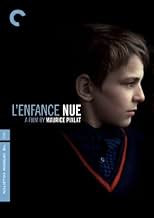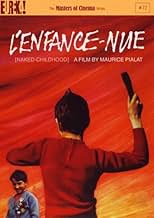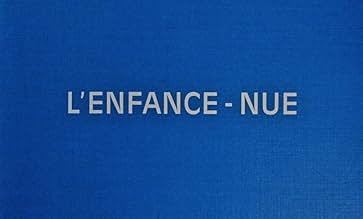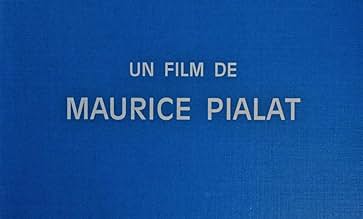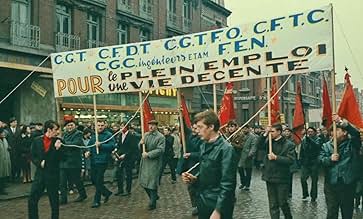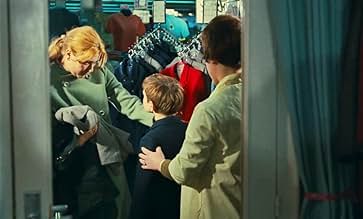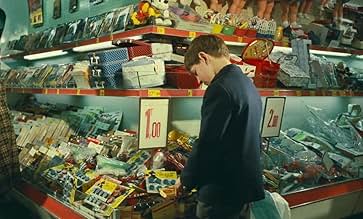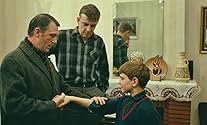IMDb RATING
7.4/10
2.9K
YOUR RATING
François, nine years old, was abandoned by his parents and placed with a family in northern France. The foster parents, overwhelmed by his unruly behavior, call the social worker, who must f... Read allFrançois, nine years old, was abandoned by his parents and placed with a family in northern France. The foster parents, overwhelmed by his unruly behavior, call the social worker, who must find him a new home.François, nine years old, was abandoned by his parents and placed with a family in northern France. The foster parents, overwhelmed by his unruly behavior, call the social worker, who must find him a new home.
- Director
- Writers
- Stars
- Awards
- 1 win & 1 nomination total
- Director
- Writers
- All cast & crew
- Production, box office & more at IMDbPro
7.42.8K
1
2
3
4
5
6
7
8
9
10
Featured reviews
10nmegahey
Pialat's incredible debut feature
Looking not unlike Jean-Pierre Léaud, Michel Tarrazon's young 10 year-old tearaway François could very well be an alternative continuation of the story of Truffaut's Antoine Doinel after the 400 Blows (Truffaut indeed was one of the film's producers alongside Claude Berri), but the treatment from Maurice Pialat, in his first feature film, is notably more harshly realist. Abandoned by his parents, François is passed from one foster family to another, each of them finding it impossible to control a young boy who inevitably has behavioural problems and gets into a lot of trouble torturing cats, stealing from other kids and wielding a large knife. Although he is given love and affection by the poor families who take him in for the little extra money they will receive, he inevitably never feels like he belongs and ends up turning against the people who want to help him.
Made when he was 43 years old, L'Enfance Nue clearly has strongly autobiographical elements although Pialat wasn't placed in the hands of the social services, he was brought up by his grandparents and did feel abandoned by his parents. The film also depicts the social circumstances of the period and the poverty of the outlying suburban districts (already the subject of the director's 1961 short film L'Amour Existe). Using non-professional actors, L'Enfance Nue consequently also has a certain almost documentary-like realism that would become characteristic of Pialat's hard-hitting style.
Made when he was 43 years old, L'Enfance Nue clearly has strongly autobiographical elements although Pialat wasn't placed in the hands of the social services, he was brought up by his grandparents and did feel abandoned by his parents. The film also depicts the social circumstances of the period and the poverty of the outlying suburban districts (already the subject of the director's 1961 short film L'Amour Existe). Using non-professional actors, L'Enfance Nue consequently also has a certain almost documentary-like realism that would become characteristic of Pialat's hard-hitting style.
Captures the essence of humanity
François Fournier (Michel Terrazon) is a ten-year old boy dumped into the foster care system in France by his single mother, whom the film suggests was mentally ill. Maurice Pialat's first feature L'enfance nue is an unsentimental look at the foster care system in France and its effects on those in its care. Written by Maurice Pialat and Arlette Langmann and performed by non-professional actors with much of the dialogue unscripted, L'enfance nue comes from the director's own experience of being raised by his grandparents and the emotional distance he felt towards his biological mother and father. Though the film lacks peak dramatic moments and emotional payoffs, in its volatile main character; it captures the essence of humanity, in all of its contradictions.
François personifies that ambivalence. He can be goodhearted and mean-spirited, cruel and kind, angry and loving, a cauldron of emotions that are sometimes hidden below the surface and sometimes acted out. Like most children, he is inarticulate and is at a loss to explain his actions, but the film does not seek any explanation. It just observes rather than judges. As the film opens, we see a protest march about economic conditions, but we soon learn that this is not a political statement, only a suggestion of the socio-economic area in which the film is set. François is living in the home of foster parents Simone (Linda Gutemberg) and Roby Joigny (Roual Billerey) who are unable to have their own children.
We see him steal a watch, then flush it down the toilet, dropping his foster sister Josette's (Pierrette Deplanque) cat down a stairwell, refusing to eat, and peeing on the floor around his bed. Unable to cope, his foster parents deliver him back to Social Services but, again confounding our expectations, François lovingly buys a gift for his foster mother and seems genuinely sad about leaving. After a revealing scene at the adoption center where prospective parents size up the orphans in a way that reminded me of the slave auction in "12 Years a Slave," François is placed in the home of an older couple, the Thierry's (Marie-Louise and René Thierry, real-life foster parents) whom he calls Grandma and Grandpa.
Also in the home are Raoul (Henri Puff), a teenage foster child, a younger girl, and Mrs. Thierry's elderly mother Nana (Marie Marc), who is mostly confined to bed. François responds to the tenderness shown by Nana who reads to him, sings songs with him, and talks about her life. They even discuss the meaning of the word "mistress." We think there is progress when he shows a sense of guilt for the first time after he steals Nana's coin purse and then quietly puts it back under her pillow. François is also drawn to Grandpa and spontaneously kisses him after he hears stories about the old man's activities with the French Resistance during World War II.
Eventually, however, even the Thierry's begin to question his normality after he throws a knife at Raoul, deliberately spills soup on his brother's lap, smokes cigarettes and hangs out with his neighborhood toughs who together decide to throw iron bars at passing cars from an elevated bridge, an adventure that leads to serious consequences. With his very expressive eyes that seem to look right through you, Michel Terrazon is remarkable as the young man acting out his anger. Others are notable as well including Henri Puff's as young Raoul, but it is Terrazon's memorable performance that remains with us and haunts our dreams.
François personifies that ambivalence. He can be goodhearted and mean-spirited, cruel and kind, angry and loving, a cauldron of emotions that are sometimes hidden below the surface and sometimes acted out. Like most children, he is inarticulate and is at a loss to explain his actions, but the film does not seek any explanation. It just observes rather than judges. As the film opens, we see a protest march about economic conditions, but we soon learn that this is not a political statement, only a suggestion of the socio-economic area in which the film is set. François is living in the home of foster parents Simone (Linda Gutemberg) and Roby Joigny (Roual Billerey) who are unable to have their own children.
We see him steal a watch, then flush it down the toilet, dropping his foster sister Josette's (Pierrette Deplanque) cat down a stairwell, refusing to eat, and peeing on the floor around his bed. Unable to cope, his foster parents deliver him back to Social Services but, again confounding our expectations, François lovingly buys a gift for his foster mother and seems genuinely sad about leaving. After a revealing scene at the adoption center where prospective parents size up the orphans in a way that reminded me of the slave auction in "12 Years a Slave," François is placed in the home of an older couple, the Thierry's (Marie-Louise and René Thierry, real-life foster parents) whom he calls Grandma and Grandpa.
Also in the home are Raoul (Henri Puff), a teenage foster child, a younger girl, and Mrs. Thierry's elderly mother Nana (Marie Marc), who is mostly confined to bed. François responds to the tenderness shown by Nana who reads to him, sings songs with him, and talks about her life. They even discuss the meaning of the word "mistress." We think there is progress when he shows a sense of guilt for the first time after he steals Nana's coin purse and then quietly puts it back under her pillow. François is also drawn to Grandpa and spontaneously kisses him after he hears stories about the old man's activities with the French Resistance during World War II.
Eventually, however, even the Thierry's begin to question his normality after he throws a knife at Raoul, deliberately spills soup on his brother's lap, smokes cigarettes and hangs out with his neighborhood toughs who together decide to throw iron bars at passing cars from an elevated bridge, an adventure that leads to serious consequences. With his very expressive eyes that seem to look right through you, Michel Terrazon is remarkable as the young man acting out his anger. Others are notable as well including Henri Puff's as young Raoul, but it is Terrazon's memorable performance that remains with us and haunts our dreams.
10bob998
Yes, a masterpiece
Well... Les 400 coups has been placed at no. 140 in IMDb's list of all-time great films, and as much as I admire Francois Truffaut's work, I am more impressed by L'Enfance nue, Pialat's first film, made when he was 43. Owing to the vagaries of the distribution system, I never saw it when it first appeared, and am now able to write about it thanks to TFO's enlightened film series.
Pialat was a realist, maybe to the point of turning off his audiences. If you have seen A nos amours or Loulou, you know you're in for a gruelling experience. Actors pushed to the breaking point, cutting that puts you right in the action, without any establishing background. The scene between Francois and Raoul, where the latter gets out of bed to look for Francois, then the knife slams into the door, just missing Raoul's head by inches, is unforgettable.
The actors are mostly amateurs; they do not try to attract your attention with gestures or speech, they just settle in and tell the story. The "assistance publique" workers are sympathetically rendered: there's no hint of Pialat trying to settle scores with government agencies (cf Une si jolie petite plage). The Minguet family, the second one we see--how many have there been in all?--is beautifully drawn. Just to watch Madame bringing soup to Meme, arranging the clothes, the napkin, it's a marvel of observation. The story hinges on Francois, of course, and his performance is angry, violent, joyous, destructive--he's Pialat's alter ego, I can't help but feel.
Pialat was a realist, maybe to the point of turning off his audiences. If you have seen A nos amours or Loulou, you know you're in for a gruelling experience. Actors pushed to the breaking point, cutting that puts you right in the action, without any establishing background. The scene between Francois and Raoul, where the latter gets out of bed to look for Francois, then the knife slams into the door, just missing Raoul's head by inches, is unforgettable.
The actors are mostly amateurs; they do not try to attract your attention with gestures or speech, they just settle in and tell the story. The "assistance publique" workers are sympathetically rendered: there's no hint of Pialat trying to settle scores with government agencies (cf Une si jolie petite plage). The Minguet family, the second one we see--how many have there been in all?--is beautifully drawn. Just to watch Madame bringing soup to Meme, arranging the clothes, the napkin, it's a marvel of observation. The story hinges on Francois, of course, and his performance is angry, violent, joyous, destructive--he's Pialat's alter ego, I can't help but feel.
Amazingly realistic and non-theatrical.
Arlette Langmann and Maurice Pialat wrote the screenplay for "Naked Childhood" and Pialat himself directed this film. In many ways, it is reminiscent of the story of Antoine Doinel in Truffaut's film "The 400 Blows", as it follows a neglected child through the foster care system--a very grim one indeed. Apparently, the story was inspired by an actual child who was raised by foster parents Marie-Louise and René Thierry--two folks who the director asked to appear in this film as the elderly foster parents.
This is the story about a young boy who was given up by his mother to the foster care system. The child, François (Michel Terrazon) acts out in response to being rejected in his first foster home--and as a result, is passed on to another foster home. The bottom line is that the boy has learned to be angry and violent and he appears to be headed for disaster unless something changes very quickly. Is there any hope for the kid? Can the elderly couple get through to him? This is an unusual film because it does not feature non-stop action and suspense. Sometimes the film is a bit slow--but not in a bad way--more like real life. It also features a little boy who is far from perfect but who is not constantly bad, either--he's more amoral than anything else. I liked this, as life is very rarely black & white--though it frequently is in movies. And, the film really doesn't have an ending. Because of this, the film feels more like a slice of life than a movie--which is pretty typical of the French New Wave style of the 1960s. It's probably not the sort of thing the average viewer would like, but it is a quality production. While this sort of thing does not make for the most pleasant viewing, having worked in the welfare system myself many years ago, I can certainly relate to the story of the boy--having seen kids passed on from one home to another to another. It's really no wonder the kids often act out and what is amazing is that many don't!
This is the story about a young boy who was given up by his mother to the foster care system. The child, François (Michel Terrazon) acts out in response to being rejected in his first foster home--and as a result, is passed on to another foster home. The bottom line is that the boy has learned to be angry and violent and he appears to be headed for disaster unless something changes very quickly. Is there any hope for the kid? Can the elderly couple get through to him? This is an unusual film because it does not feature non-stop action and suspense. Sometimes the film is a bit slow--but not in a bad way--more like real life. It also features a little boy who is far from perfect but who is not constantly bad, either--he's more amoral than anything else. I liked this, as life is very rarely black & white--though it frequently is in movies. And, the film really doesn't have an ending. Because of this, the film feels more like a slice of life than a movie--which is pretty typical of the French New Wave style of the 1960s. It's probably not the sort of thing the average viewer would like, but it is a quality production. While this sort of thing does not make for the most pleasant viewing, having worked in the welfare system myself many years ago, I can certainly relate to the story of the boy--having seen kids passed on from one home to another to another. It's really no wonder the kids often act out and what is amazing is that many don't!
An honest, realistic portrayal of a broken childhood
Naked childhood or L'enfance nue (original title) is a film that deals with issues such as under-privileged children, foster-parenting and in general children being raised apart from their parents. The director approaches his subject with a realistic, almost documentary narrative with the least amount of dramatization. Therefore viewers will be shown a pretty straightforward story about a troublesome kid and what he is going through with foster-parents, school, social service agents and so on.
I think the film does a good job at showing us that no one's to blame for what eventually happens in these scenarios and yet the current method is a failure for these children. It's a film that is not very shocking or disturbing (although there are couple scenes) but it can make one think for a while.
I think the film does a good job at showing us that no one's to blame for what eventually happens in these scenarios and yet the current method is a failure for these children. It's a film that is not very shocking or disturbing (although there are couple scenes) but it can make one think for a while.
Did you know
- TriviaMarie-Louise Thierry and René Thierry were real life foster parents. Maurice Pialat became acquainted with the couple and cast them in lead roles after he began researching the plight of children in the foster care system.
- ConnectionsFeatured in The Time It Takes (2024)
- How long is Naked Childhood?Powered by Alexa
Details
Box office
- Gross worldwide
- $1,993
- Runtime
- 1h 23m(83 min)
- Sound mix
- Aspect ratio
- 1.66 : 1
Contribute to this page
Suggest an edit or add missing content

